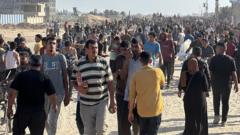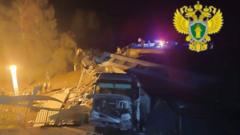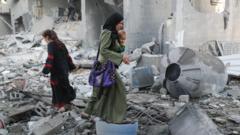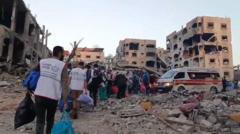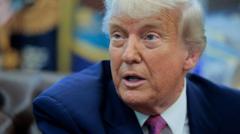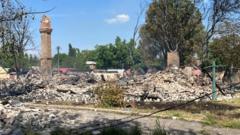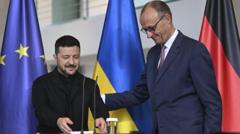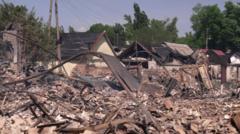As Turkey gears up to host a second round of peace talks, Ukraine awaits Russia's proposal for a ceasefire to facilitate dialogue.
Ukraine Awaits Proposal for Peace as Istanbul Talks Approach

Ukraine Awaits Proposal for Peace as Istanbul Talks Approach
Preparations in Turkey set for key discussions between Ukraine and Russia.
Russia's Kremlin has announced its attendance for the upcoming peace discussions in Istanbul, scheduled for Monday. Spokesperson Dmitry Peskov indicated that the nation is formulating conditions for a temporary truce to be addressed during the talks. Ukraine, while asserting its commitment to a peaceful resolution, has stated it will not participate until it receives specifics on Russia's ceasefire offer. The previous meeting yielded a significant prisoner exchange, marking a major event since the escalation of hostilities.
Ukrainian Foreign Minister Andrii Sybiha emphasized the country's vision for future negotiations, asserting that an unconditional ceasefire is crucial for moving forward. "We are keen to see these discussions progress because ending the war remains our priority this year," he declared at a joint press conference with his Turkish counterpart, Hakan Fidan. Although high-profile leaders, including President Volodymyr Zelensky and President Vladimir Putin, are not expected at the upcoming talks, Fidan expressed hopes of eventually coordinating a summit featuring global leaders to address the conflict.
Peskov conditioned any potential high-level dialogue on tangible advancements in the preliminary negotiations. In the backdrop, remarks from retired General Keith Kellogg, an envoy for President Trump, highlighted Russian apprehensions regarding NATO's expansion, with assurances that Ukraine's accession to the alliance is currently not feasible. Kellogg noted that Trump is exasperated by Russia's stubbornness yet believes in maintaining open lines for negotiation.
In a separate development, German Chancellor Friedrich Merz recently assured Ukrainian President Zelensky of Berlin's support in producing long-range missiles for Ukraine's defense against future threats from Russia. The Kremlin, however, cautioned that such a shift in weapon policy could jeopardize prospects for peace, as Moscow currently holds significant parts of Ukraine, including Crimea.
As anticipation builds for the talks amidst these complex dynamics, the international community watches closely to see if progress can be achieved in the labyrinth of diplomacy surrounding the ongoing conflict.
Ukrainian Foreign Minister Andrii Sybiha emphasized the country's vision for future negotiations, asserting that an unconditional ceasefire is crucial for moving forward. "We are keen to see these discussions progress because ending the war remains our priority this year," he declared at a joint press conference with his Turkish counterpart, Hakan Fidan. Although high-profile leaders, including President Volodymyr Zelensky and President Vladimir Putin, are not expected at the upcoming talks, Fidan expressed hopes of eventually coordinating a summit featuring global leaders to address the conflict.
Peskov conditioned any potential high-level dialogue on tangible advancements in the preliminary negotiations. In the backdrop, remarks from retired General Keith Kellogg, an envoy for President Trump, highlighted Russian apprehensions regarding NATO's expansion, with assurances that Ukraine's accession to the alliance is currently not feasible. Kellogg noted that Trump is exasperated by Russia's stubbornness yet believes in maintaining open lines for negotiation.
In a separate development, German Chancellor Friedrich Merz recently assured Ukrainian President Zelensky of Berlin's support in producing long-range missiles for Ukraine's defense against future threats from Russia. The Kremlin, however, cautioned that such a shift in weapon policy could jeopardize prospects for peace, as Moscow currently holds significant parts of Ukraine, including Crimea.
As anticipation builds for the talks amidst these complex dynamics, the international community watches closely to see if progress can be achieved in the labyrinth of diplomacy surrounding the ongoing conflict.


